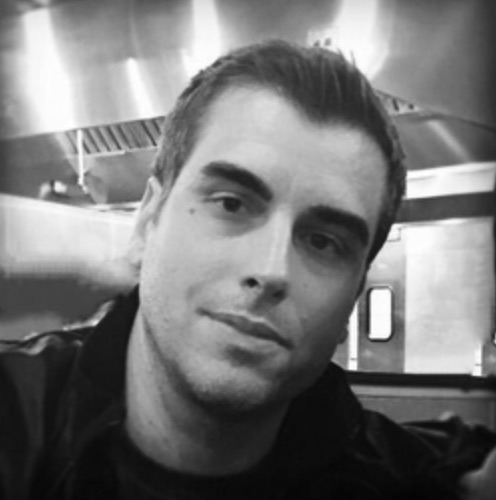Virginia Beach native Andrew Scott Bell writes film music in Los Angeles.

More than 20 years after falling in love with Alan Silvestri’s majestic score for Forrest Gump, Virginia Beach native Andrew Scott Bell, now 30, moved to Los Angeles to pursue a career as a film music composer. Among his works is the score for the short film Rocket which received an Oscar in the Narrative category at the 2016 Student Academy Awards hosted by the Academy of Motion Picture Arts and Sciences. We talked to Bell about his unusual and ambitious career choice.
How does one decide to score films for a living?
For me the choice grew from my love of storytelling and especially from my love of films. Storytelling is such a huge part of how we communicate and share the experience of being human with one another. It’s so deeply ingrained in our history. There’s something magical about it, and I love that my music can help add to that tradition in some small way. As a child, I can remember first wanting to be an actor. I used to practice in front of the mirror instead of brushing my teeth. That eventually evolved into wanting to work in animation, which led to an interest in directing. Eventually my parents pointed out to me that when I talked about movies, I would often describe the music in a scene. So in some way I think I may have been searching for my voice in filmmaking, and I’m so thankful for their help and support in finding it.
What movie pushed you over the edge to decide to pursue this line of work?
As I look back at some of the favorite films from my childhood, I realize their scores affected my love of those films more than I knew at the time. One that has affected me more than the rest is Alan Silvestri’s score to Forrest Gump. My parents owned the two-disc soundtrack which was mostly comprised of the rock and folk songs used in the film, but the last track on the second disc was Silvestri’s suite of themes. I remember rushing home from school straight to the piano so I could play along and learn the score by ear. Silvestri’s music has had an enormous impact on me, that score especially. The other film that pushed me over the edge into deciding to pursue this as a career was Gladiator. Hans Zimmer’s score was nominated for an academy award in 2000. I was 14 at the time. I watched the Oscars that year as if I were watching a sporting event and rooting for my favorite team. It was the first time I really considered making a career in film scoring.
Who is your favorite film score composer and why?
Always a challenging question to answer. There are so many composers who’ve influenced me and whom I greatly admire, I feel like the list is always changing. John Williams is certainly at the top. His score to E.T. is one of the best spotted film scores I’ve ever encountered. Alan Silvestri’s music has been hugely influential to me. I mentioned Forrest Gump, but Back to the Future had an enormous impact on me as well. James Horner and Michael Kamen have both had a huge impact on me. Michael Giacchino is a composer I’m particularly excited about right now. I’ve been following his career since The Incredibles. He and John Powell are really paving the way for the return of large orchestral melodies. It’s very exciting. I also have to mention James Newton Howard who has been a favorite of mine for at least a decade. I really admire his music and his process. I’m sorry. You might as well have asked me to pick a favorite cheese. I just can’t do it.
What makes the music so important in film?
Music is another tool in a director’s toolbox which she can use to tell a story. To what extent music plays a role in the storytelling varies from picture to picture. I personally see music in film as an emotional thread running through the entire picture. Music can tie one scene to another and help an audience draw those emotional connections. In certain films, the score can function as an omniscient narrator. The return of a familiar melody or an ominous tone will tell an audience exactly how to view the coming scene. Music is not always necessary, though. One of the challenges I try to be conscious of is choosing when not to score a scene.
How do you go about writing a score?
The score is one of the last elements added to a film. The director and producers I work with have been on that film for months and often years before I join the team. There’s quite a bit of emotional catch up for a composer to do, so there’s a good amount of work I put in before I even write a single note. I spend a lot of time talking with the director about the film. I really try to understand her perspective and delve into what she’s looking to achieve. The more I can get on the same page with my director early on, the better the end product will be. Once we’re on the same page and we’ve discussed each scene and where the music will be, I start writing thematic material. Once the material is sketched out and approved by the director, I can start mapping where those themes will play throughout the film and work on writing those scenes. I like to work very closely with a director throughout the whole process. I’ve found the best work is created in large part due to the partnership and trust I develop with my director. That relationship can be incredibly rewarding.
The announcement of the 2018 Academy Award nominations are just around the corner. Your predictions for best movie and score?
To be fair, I haven’t seen all the 2017 scores that will undoubtedly be nominated. John Williams will be nominated for The Last Jedi, of course, but it hasn’t come out yet, and I never got to see Dunkirk (I know, shame on me). I’ve yet to see Phantom Thread, but I love Jonny Greenwood’s scores and I’ve been told the music is incredible. I recently saw The Shape of Water followed by a Q&A with composer Alexandre Desplat. That score is wonderful. It brings the film to life. The score I loved the most and hope wins (of the films I’ve seen this year) is Wonderstruck by Carter Burwell. My wife and I were fortunate to attend a screening of the film with a live orchestra. We were completely blown away. It’s heartwarming and beautiful. Go see the film if you haven’t. AndrewScottBellMusic.com









